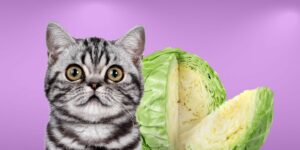Nutritional Content of Cucumbers
Cucumbers are a low-calorie, nutrient-rich vegetable that can provide several essential vitamins and minerals for both humans and cats. Some of these nutrients include:
Vitamin K
Vitamin K plays a crucial role in blood clotting and bone health. Cats require a small amount of Vitamin K in their diet, and cucumbers can be a good source of this nutrient.
Vitamin C
Although cats can synthesize Vitamin C on their own, consuming small amounts of this antioxidant through their diet can still be beneficial.
Potassium
Potassium is an essential mineral that helps to regulate fluid balance, nerve function, and muscle activity in cats.
Magnesium
Magnesium is an essential mineral that plays a role in various biochemical reactions in cats, including energy production and muscle function.
Antioxidants
Cucumbers contain antioxidants that can help to protect cells from damage caused by free radicals.
Fiber
Although cats are obligate carnivores and do not require a high amount of dietary fiber, some fiber can help with digestion and maintaining a healthy weight.
Cucumbers as a Source of Enrichment for Cats
Cats are natural hunters and enjoy engaging in play and exploration. Offering cucumber slices as a novel food item can provide mental stimulation and encourage play, especially if the cucumber is presented in an interesting way, such as:
Floating cucumber slices in water
This can provide a fun, interactive experience for your cat as they try to fish out the cucumber slices.
Placing cucumber slices on a treat puzzle or dispenser
This can encourage your cat to use their problem-solving skills to access the cucumber treat.
Hiding cucumber slices in toys or around the house
Hide cucumber slices in various locations to stimulate your cat's natural hunting instincts.
Signs of Allergic Reaction or Intolerance
While most cats can safely consume cucumbers, some may experience an allergic reaction or intolerance to the vegetable. Keep an eye out for these signs:
Vomiting
If your cat vomits after consuming cucumber, it may be an indication that their digestive system is having difficulty processing the vegetable.
Diarrhea
Diarrhea can be a sign of food intolerance or sensitivity to the cucumber.
Itchy skin
If your cat displays excessive itching or scratching after consuming cucumber, they may be experiencing an allergic reaction.
Swelling or hives
Swelling or hives on your cat's skin can indicate an allergic reaction to the cucumber.
Difficulty breathing
If your cat has difficulty breathing after eating cucumber, it could be a sign of a severe allergic reaction that warrants immediate veterinary attention.
If you notice any of these signs, discontinue feeding cucumber to your cat and consult with your veterinarian.
Alternatives to Cucumbers for Cats
If your cat doesn't seem to enjoy cucumbers, or if you're looking for other safe fruits and vegetables to offer as a treat, consider the following options:
Cooked pumpkin or squash
These vegetables are high in fiber and can be beneficial for your cat's digestive system.
Steamed green beans
Green beans are a low-calorie vegetable that can be a healthy alternative snack for cats.
Cooked sweet potatoes
Sweet potatoes are rich in fiber and various vitamins and minerals, and can be a nutritious addition to your cat's diet in small amounts.
Steamed carrots
Carrots are a good source of various nutrients, such as Vitamin A, and can be safely fed to cats in moderation.
Steamed or boiled peas
Peas are a source of various vitamins and minerals, and can be a safe treat for cats when cooked and served in small amounts.
Sliced bell peppers
Bell peppers are rich in various nutrients and can be offered to cats as a low-calorie treat in moderation.
Always make sure to consult with your veterinarian before introducing any new foods to your cat's diet.
Frequently Asked Questions
Can cats eat cucumber seeds?
Cucumber seeds are not toxic to cats, but it is still recommended to remove them before feeding cucumber slices to your cat as a precaution.
Can cats eat cucumber peels?
Cucumber peels can potentially be tough for cats to digest, so it is best to remove the peel before feeding cucumber to your cat.
Can kittens eat cucumbers?
Kittens can try cucumbers in small amounts, but their main focus should be on consuming a balanced, age-appropriate diet to ensure proper growth and development.
Can cats eat pickles?
Pickles are not recommended for cats, as the high sodium content and added preservatives can be harmful to their health.
How often can I give my cat cucumbers?
Cucumbers should be fed to cats in moderation, as an occasional treat, and should not make up more than 10% of their daily caloric intake.
Final Thoughts
Cats can eat cucumbers as an occasional treat, and they may provide some nutritional benefits and enrichment. However, it's important to always monitor your cat's reaction to new foods and consult with your veterinarian if you have concerns or questions about your cat's diet. Remember that a well-balanced diet is essential for your cat's overall health and well-being.











